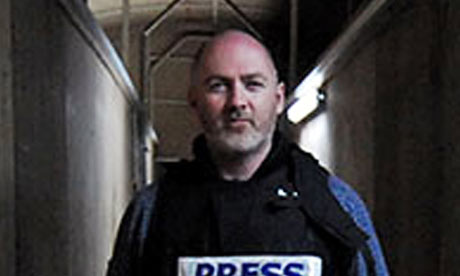
Rescued New York Times reporter Stephen Farrell in Iraq in 2007. Photograph: Marko Georgiev/AFP/Getty
News organisations have warned that the deteriorating security situation in Afghanistan could affect their coverage of the conflict in the country, following the rescue of a kidnapped New York Times journalist in which a British soldier was killed early today.
The New York Times journalist, the UK-born Stephen Farrell, was freed from his Taliban captors in northern Afghanistan in a pre-dawn raid in which his translator, Sultan Munadi, and a British soldier, believed to be paratrooper who was a member of the special forces suppport group, were killed.
Harriet Sherwood, head of international news at the Guardian, compared Afghanistan with Iraq at the height of the insurgency that followed the US-led invasion of the country in 2003.
Sherwood said Afghanistan was not yet as dangerous but added that she was concerned that it may soon be. "It is not quite at the level Baghdad was at at its
worst but I fear it may get that way," she said.
Richard Beeston, the Times's foreign editor, said: "It is clearly getting worse. Kabul is still relatively safe as long as you take sensible precautions. It is still better than it was in Baghdad in 2006 and 2007, [when] it was very difficult to move around the city, [but] it could deteriorate in Kabul, too."
The Times currently has two correspondents in the country; Farrell was formerly a foreign correspondent for the paper before moving to the New York Times. Beeston said that Times staff working in the country now had to be far more cautious, "which obviously inhibits the reporting".
Beeston said it was possible that the Taliban would seek to avenge Farrell's rescue by deliberately targeting reporters.
Afghanistan is rated 156th out of 173 countries in terms of press freedom in the latest worldwide index compiled by Reporters Sans Frontiers, the French group that campaigns against censorship and violence against journalists.
At least seven journalists have been kidnapped in Afghanistan since September 2008, according to RSF. The organisation's most recent report on the country said: "The Taliban remain the foremost press freedom predators, but judges, prosecutors, political chiefs and religious leaders also regularly go after journalists and free expression activists, sometimes resorting to violence."
Peter Horrocks, the director of the BBC World Service, which runs a Persian-language TV and radio service in the country, said that the organisation was preparing for a long war.
"We hear what the politicians and the military are saying. We are gearing up for a story we have to cover for a long time to come," he added.
Horrocks ackowledged that "there are some parts of the country where it is impossible to operate without being on the side of the western military", but said the BBC was determined to avoid "report[ing] from behind barriers".
He added that "experienced [local] stringers and reporters" could "sometimes operate more effectively than western reporters" in Afghanistan and that the World Service would continue to use them widely.
"Some of the reporting about the aftermath of the elections and [allegations] of fraud has been dug up by members of the Persian TV team," he said.
The Guardian's Sherwood said the fact that Farrell's interpreter was killed demonstrated that "locals are not immune from the danger", and pointed out that local journalists often face the most serious threats.
"By far the biggest number of journalists killed in Iraq have been Iraqis," she said. "Any responsible news organisation would review its procedures and security arrangements [in Afghanistan]."
Sherwood said she was concerned about the number of conflicts that were becoming increasingly difficult for news organisations to cover, citing government attempts to prevent journalists from gaining access to war zones in Sri Lanka and Gaza.
Beeston agreed there is a "a tendency to try to [control] access to comfort zones by governments to prevent unfavourable journalism", citing recent examples in Gaza and Chechnya.
"The Israeli government made it very difficult to get into Gaza, although so too did the Palestinians. The Russian did the same thing in the second Chechen war. There was basically a news blackout," he said.
Beeston said news organisations were increasingly employing undercover techniques to cover global trouble spots, including Zimbabwe, Sri Lanka and Burma, despite the risks involved.
Journalists who travelled as tourists risked being punished "by very repressive regimes" if they were caught, Beeston said. "I would say it is getting tougher. We are entering a very difficult phase."
• To contact the MediaGuardian news desk email editor@mediaguardian.co.uk or phone 020 3353 3857. For all other inquiries please call the main Guardian switchboard on 020 3353 2000.
Education for Liberation! Venceremos Unidos!
Peter S. Lopez ~aka ~Peta-de-Aztlan~
Sacramento, California, Aztlan
Yahoo Email: peter.lopez51@yahoo.com
Come Together! Join Up! Seize the Time!
http://groups.yahoo.com/group/Humane-Rights-Agenda/
http://humane-rights-agenda-network.ning.com/
http://humane-rights-agenda.blogspot.com/
++++++++++++++++++++++++++++++++++++++
http://groups.yahoo.com/group/NetworkAztlan_News/
http://groups.yahoo.com/group/THIRD-WORLD-NEWS/
c/s

No comments:
Post a Comment